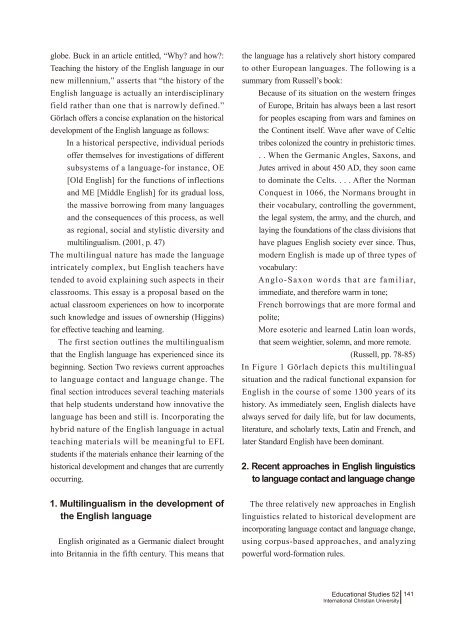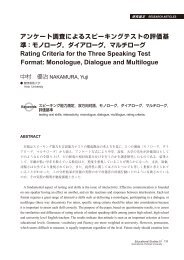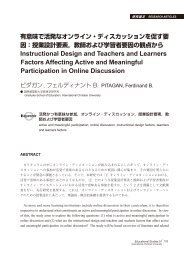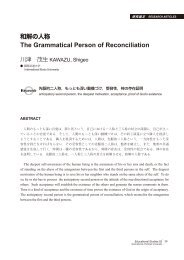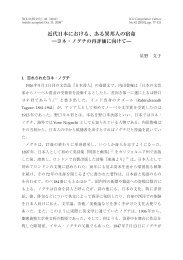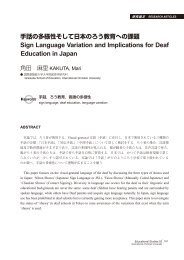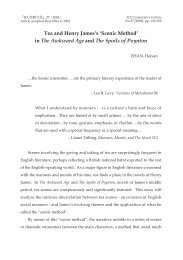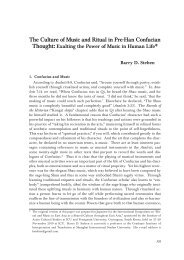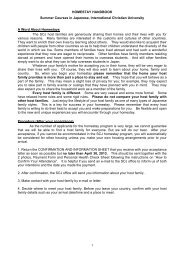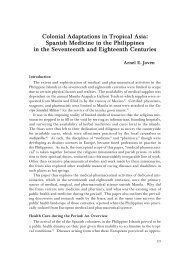Incorporating Multilingualism in the Development of the English ...
Incorporating Multilingualism in the Development of the English ...
Incorporating Multilingualism in the Development of the English ...
Create successful ePaper yourself
Turn your PDF publications into a flip-book with our unique Google optimized e-Paper software.
globe. Buck <strong>in</strong> an article entitled, “Why? and how?:Teach<strong>in</strong>g <strong>the</strong> history <strong>of</strong> <strong>the</strong> <strong>English</strong> language <strong>in</strong> ournew millennium,” asserts that “<strong>the</strong> history <strong>of</strong> <strong>the</strong><strong>English</strong> language is actually an <strong>in</strong>terdiscipl<strong>in</strong>aryfield ra<strong>the</strong>r than one that is narrowly def<strong>in</strong>ed.”Görlach <strong>of</strong>fers a concise explanation on <strong>the</strong> historicaldevelopment <strong>of</strong> <strong>the</strong> <strong>English</strong> language as follows:In a historical perspective, <strong>in</strong>dividual periods<strong>of</strong>fer <strong>the</strong>mselves for <strong>in</strong>vestigations <strong>of</strong> differentsubsystems <strong>of</strong> a language-for <strong>in</strong>stance, OE[Old <strong>English</strong>] for <strong>the</strong> functions <strong>of</strong> <strong>in</strong>flectionsand ME [Middle <strong>English</strong>] for its gradual loss,<strong>the</strong> massive borrow<strong>in</strong>g from many languagesand <strong>the</strong> consequences <strong>of</strong> this process, as wellas regional, social and stylistic diversity andmultil<strong>in</strong>gualism. (2001, p. 47)The multil<strong>in</strong>gual nature has made <strong>the</strong> language<strong>in</strong>tricately complex, but <strong>English</strong> teachers havetended to avoid expla<strong>in</strong><strong>in</strong>g such aspects <strong>in</strong> <strong>the</strong>irclassrooms. This essay is a proposal based on <strong>the</strong>actual classroom experiences on how to <strong>in</strong>corporatesuch knowledge and issues <strong>of</strong> ownership (Higg<strong>in</strong>s)for effective teach<strong>in</strong>g and learn<strong>in</strong>g.The first section outl<strong>in</strong>es <strong>the</strong> multil<strong>in</strong>gualismthat <strong>the</strong> <strong>English</strong> language has experienced s<strong>in</strong>ce itsbeg<strong>in</strong>n<strong>in</strong>g. Section Two reviews current approachesto language contact and language change. Thef<strong>in</strong>al section <strong>in</strong>troduces several teach<strong>in</strong>g materialsthat help students understand how <strong>in</strong>novative <strong>the</strong>language has been and still is. <strong>Incorporat<strong>in</strong>g</strong> <strong>the</strong>hybrid nature <strong>of</strong> <strong>the</strong> <strong>English</strong> language <strong>in</strong> actualteach<strong>in</strong>g materials will be mean<strong>in</strong>gful to EFLstudents if <strong>the</strong> materials enhance <strong>the</strong>ir learn<strong>in</strong>g <strong>of</strong> <strong>the</strong>historical development and changes that are currentlyoccurr<strong>in</strong>g.<strong>the</strong> language has a relatively short history comparedto o<strong>the</strong>r European languages. The follow<strong>in</strong>g is asummary from Russell’s book:Because <strong>of</strong> its situation on <strong>the</strong> western fr<strong>in</strong>ges<strong>of</strong> Europe, Brita<strong>in</strong> has always been a last resortfor peoples escap<strong>in</strong>g from wars and fam<strong>in</strong>es on<strong>the</strong> Cont<strong>in</strong>ent itself. Wave after wave <strong>of</strong> Celtictribes colonized <strong>the</strong> country <strong>in</strong> prehistoric times.. . When <strong>the</strong> Germanic Angles, Saxons, andJutes arrived <strong>in</strong> about 450 AD, <strong>the</strong>y soon cameto dom<strong>in</strong>ate <strong>the</strong> Celts. . . . After <strong>the</strong> NormanConquest <strong>in</strong> 1066, <strong>the</strong> Normans brought <strong>in</strong><strong>the</strong>ir vocabulary, controll<strong>in</strong>g <strong>the</strong> government,<strong>the</strong> legal system, <strong>the</strong> army, and <strong>the</strong> church, andlay<strong>in</strong>g <strong>the</strong> foundations <strong>of</strong> <strong>the</strong> class divisions thathave plagues <strong>English</strong> society ever s<strong>in</strong>ce. Thus,modern <strong>English</strong> is made up <strong>of</strong> three types <strong>of</strong>vocabulary:Anglo-Saxon words that are familiar,immediate, and <strong>the</strong>refore warm <strong>in</strong> tone;French borrow<strong>in</strong>gs that are more formal andpolite;More esoteric and learned Lat<strong>in</strong> loan words,that seem weightier, solemn, and more remote. (Russell, pp. 78-85)In Figure 1 Görlach depicts this multil<strong>in</strong>gualsituation and <strong>the</strong> radical functional expansion for<strong>English</strong> <strong>in</strong> <strong>the</strong> course <strong>of</strong> some 1300 years <strong>of</strong> itshistory. As immediately seen, <strong>English</strong> dialects havealways served for daily life, but for law documents,literature, and scholarly texts, Lat<strong>in</strong> and French, andlater Standard <strong>English</strong> have been dom<strong>in</strong>ant.2. Recent approaches <strong>in</strong> <strong>English</strong> l<strong>in</strong>guisticsto language contact and language change1. <strong>Multil<strong>in</strong>gualism</strong> <strong>in</strong> <strong>the</strong> development <strong>of</strong><strong>the</strong> <strong>English</strong> language<strong>English</strong> orig<strong>in</strong>ated as a Germanic dialect brought<strong>in</strong>to Britannia <strong>in</strong> <strong>the</strong> fifth century. This means thatThe three relatively new approaches <strong>in</strong> <strong>English</strong>l<strong>in</strong>guistics related to historical development are<strong>in</strong>corporat<strong>in</strong>g language contact and language change,us<strong>in</strong>g corpus-based approaches, and analyz<strong>in</strong>gpowerful word-formation rules.Educational Studies 52International Christian University141


